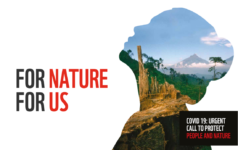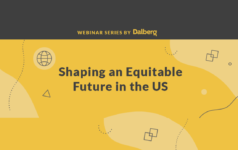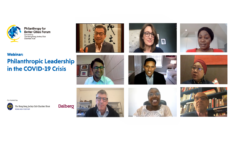Dalberg uses cookies and related technologies to improve the way the site functions. A cookie is a text file that is stored on your device. We use these text files for functionality such as to analyze our traffic or to personalize content. You can easily control how we use cookies on your device by adjusting the settings below, and you may also change those settings at any time by visiting our privacy policy page.
Covid-19 is catalyzing a transformational wave of change across the philanthropic sector around the globe. A new Dalberg study presents early insights on the effects of the crisis on foundations, and the impact their present-day response will have on the future.
Each year foundations around the globe spend more than USD 150 billion to support grantees that are working across a vast array of programs and focus areas. However, the massive social and economic disruption surrounding the 2020 global pandemic has caused philanthropic foundations to re-direct funding for emergency response and post-Covid-19 recovery according to “The Impact of Covid-19 on the Global Philanthropic Sector”, a new study from Dalberg based on input from over 80 leading global foundation leaders representing 6 continents.
The study showed that this seismic shift impacts foundations at nearly every level—from overall spending, to giving priorities, to internal operations, and strategic planning. Yet the full impact of these changes— and the long-term implications of Covid-19 on the role of philanthropy—are not yet fully known.
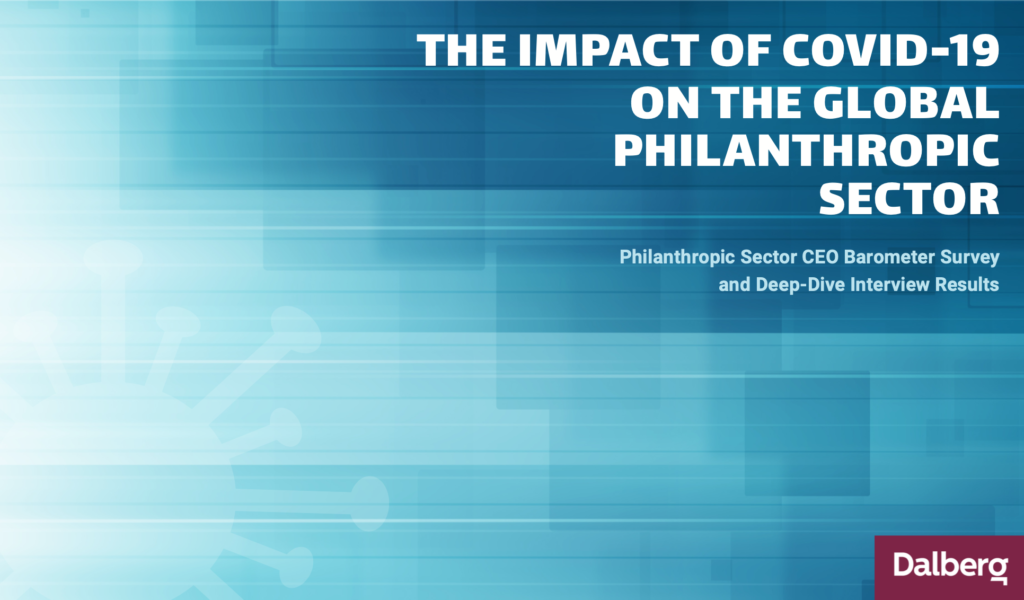
“The Impact of Covid-19 on the Global Philanthropic Sector”
The analysis in the study helps underpin Dalberg’s Covid-19 response, which focuses on how we can help today, tomorrow, and in the future. We seek to bring together communities of action, like philanthropy, that are positioned to make an outsized impact on the lives of people in the geographies and sectors they are operating in. Our analysis aims to fill current data gaps through periodic philanthropic sector leader surveys, deep-dive qualitative interviews, and other related research.
The study was launched with an initial round of surveys that focused on 170 global foundation leaders. Of these 170 leaders, 45% of them participated in the survey—and Dalberg conducted 15 deep-dive interviews to supplement the survey results. The key insights presented below and in the attached PDF summary are informed by these responses and candid discussions.
Insight 1: Most foundations have increased or are considering increasing their share of endowments disbursed in 2020 due to Covid-19 — though the impact of these funding increases on net philanthropic giving is not yet clear.
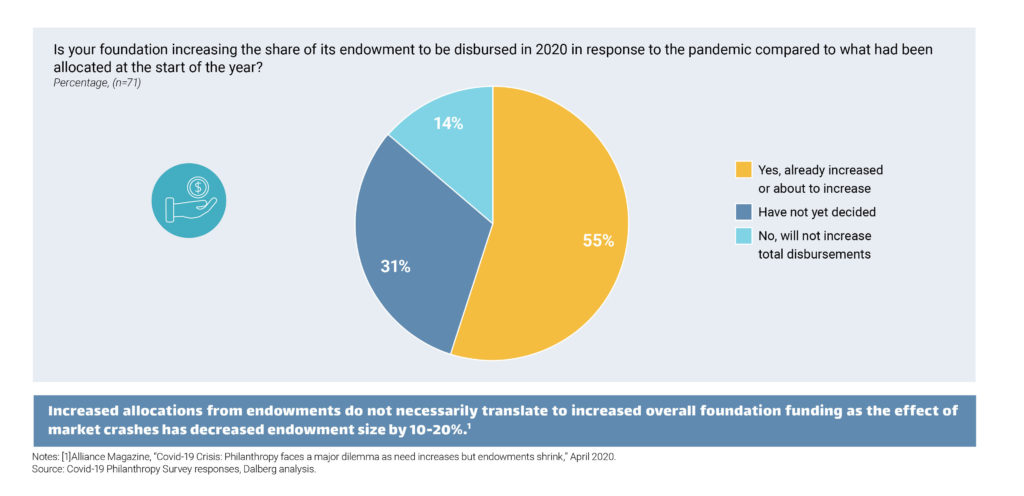
Recognizing the “hundred-year storm” nature of the crisis, an unprecedented half of foundations have already decided to increase giving as a share of their endowments in 2020, and another third are considering doing so as well.
Given the impact of the market on total endowment size, the net Covid-19 impact on foundation giving, while likely positive, is not yet clear. Foundations will allot, on average, approximately 20% of their 2020 budget to Covid-19 response (weighted by annual budget size). Some will disperse more: 40% of foundations will distribute more than a third of their 2020 budget on the response, and nearly a fifth of foundations will allot more than 50% of their annual budget to Covid-19 response and recovery. This translates to approximately USD 2bn of planned giving for Covid-19 from our survey respondents alone.
If these figures are extrapolated to draw in the broader philanthropic sector, this could mean up to USD 30bn for Covid-19 response in 2020 relative to the USD 3.5bn already committed by foundations (including family, independent, and corporate foundations) in the first few months of the crisis.
Insight 2: In the near-term, foundations are prioritizing sectors and areas that can directly mitigate the impacts of Covid-19, most notably health and economic support and recovery. At times, this occurs at the expense of sectors and issues that are seen as less urgent or have longer-term impact horizons.
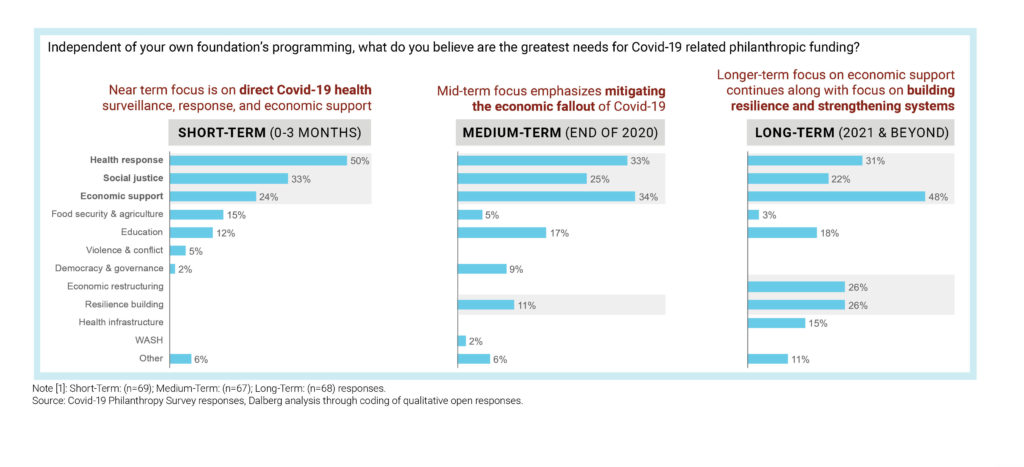
Health and economic recovery are immediate priorities across most foundations in our survey and interviews, with respondents designating approximately 50% of their 2020 Covid-19 spending towards health. Notably, a quarter of these foundations, who have committed to investing in health in 2020, did not previously have a health focus in grant-making.
Foundations are focusing health spending on issues such as testing, PPE, vaccine development, and contact tracing in the short-term. Conversely, foundations signalled concern about potential declines in funding for other areas such as climate change mitigation and adaptation, conservation and animal rights, education, arts and culture, energy access, and financial inclusion that could see near-term deprioritization or redirection of funding.
Insight 3: In the long-term, foundations feel the need to “build back stronger” and address underlying issues of inequity and social injustice.
Survey respondents reported that they recognize the glaring inequities that are brought to light, and worsened by, the pandemic. This realization is coupled with an increased awareness of the fragility of core systems such as public health infrastructure and socio-economic safety nets. Foundation leaders emphasize the need to start building resilience in core systems and planning for future shocks as they move beyond direct Covid-19 mitigation in 2020 and 2021. How much of this awareness translates into action for dismantling inequity, however, remains to be seen.
Insight 4: Foundations are particularly worried about grantee “mass-extinctions” and are drastically changing grant requirements and operating procedures to ensure the survival of grant recipients.
Widespread failures and bankruptcies are anticipated for small, community-based organizations, arts and culture organizations, small and growing businesses, and social sector start-ups in areas such as agriculture, financial inclusion, and energy access. For existing grants, foundations are loosening spending restrictions (e.g. transition to general purpose grants) to give grantees the freedom to pivot funding to new activities or to redeploy funds for core operational costs.
Many foundations are rapidly renegotiating grant milestones, objectives, and timelines. They are also providing technical assistance and top-up funding for grantees to shift programming and undertake Covid-19-related interventions.
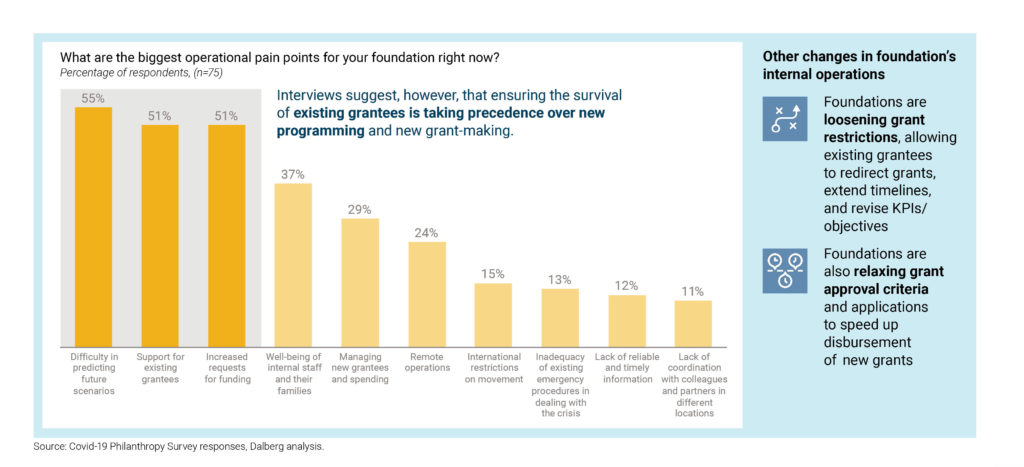
For new grants, the urgency of funding needs and operational challenges have led many foundations to streamline the process of grant selection, funding disbursal, and reducing timelines for grant approval. They have also simplified grant applications and relaxed due diligence criteria to push out funds faster.
Finding the balance between supporting existing grantees and conceptualizing new programs is an acute challenge for foundations, with many swinging to the extreme of stopping new grants. The ability to make decisions about where to focus and whom to support has also emerged as a critical pain-point for foundations.
Insight 5: These changes and the crisis, writ large, offer an opportunity for foundation leaders to reflect on longer-term strategic questions that will shape the future of the philanthropic sector.
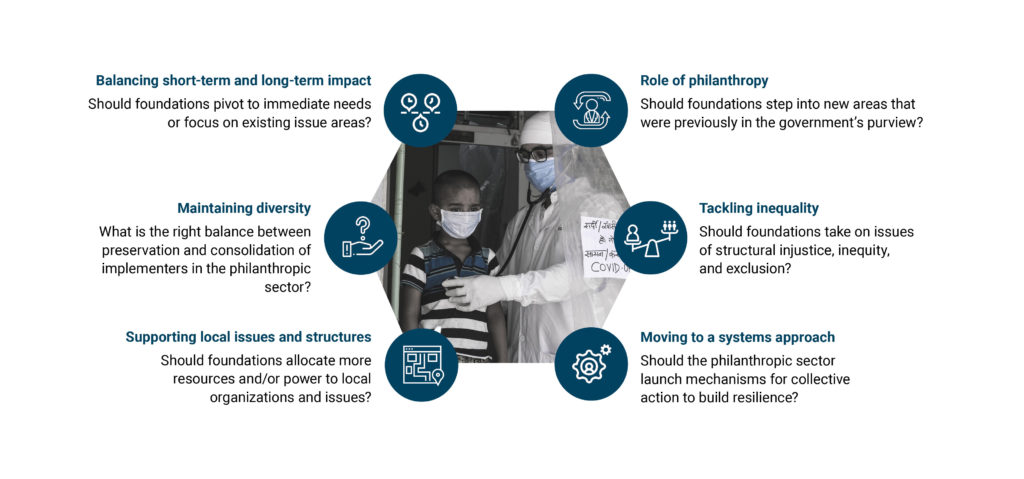
Foundation leaders are embracing the crisis as an opportunity to reflect on questions regarding philanthropy that were already being raised prior to Covid-19 but have now taken on new urgency. These questions include:
- Should foundations step into areas that are typically the purview of governments (such as public health infrastructure and safety nets), given their ability to be more nimble?
- Should foundations take on more politically charged issues that tackle the structural causes of inequality and exclusion?
- Should foundations embrace philanthropic ‘localism’ and channel more power and resources toward issues of struggling communities where they are based versus focusing on national, regional, and global challenges?
The crisis is also triggering other fundamental strategic questions for foundations and broader reflections about the role and positioning of the philanthropic sector:
- Should foundations prioritize a diversity of grantees in recovery or allow the sector to consolidate as smaller organizations fail?
- Should foundations pivot to areas of acute short-term need at the cost of longer-term impact or take a ‘counter-programming’ approach by focusing on the longer-term issues that may otherwise be neglected as public spending priorities shift to near term Covid-19 response and recovery?
- How should foundations balance long-standing principles of inclusion, transparency, accountability, and data privacy/security vs. often existential near-term challenges of rapid and effective Covid-19 crisis response?
This survey and Dalberg’s in-depth interviews are the starting point for a deeper investigation into answering some of the aforementioned questions—and we plan to significantly expand the scope and scale by looking into specific regions and drawing in more voices from across the sector moving forward.
We are partnering with additional regional philanthropy platforms to extend the survey to several thousand additional philanthropic organizations (e.g. Africa Philanthropy Forum and the Council on Foundations). The findings will be released in the coming months through a variety of online webinars, written communications, and regional philanthropy convenings.
Click here to view the Dalberg-authored study on this topic.
If you are interested in receiving more information on the upcoming webinars, published articles, or accessing additional details* of this analysis please contact: michael.tsan@dalberg.com
* including survey data, interview results, and program-level insights


